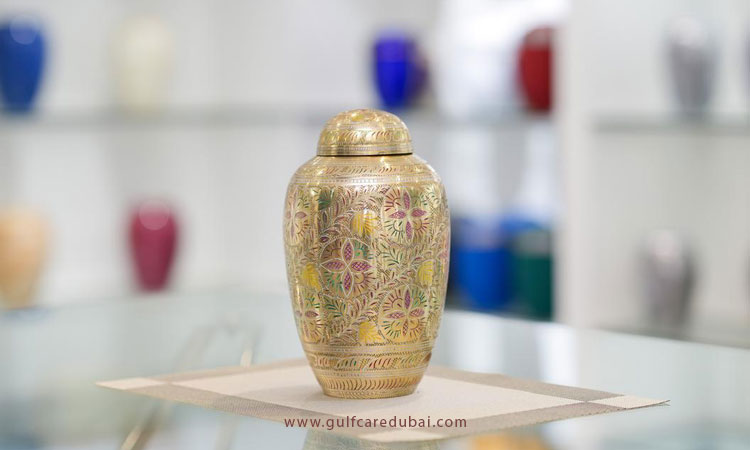In life’s journey, it is very important to understand all the aspects of end-of-life care, especially during a difficult time. It also includes the selection of the best cremation services. Choosing cremation involves the selection of a reputable cremation provider and understanding the best cremation service options.
This comprehensive guide is designed to help you understand the steps involve in planning a dignified cremation. It covers choosing best cremation services, planning the memorial service and what to expect before, during, and after the cremation process. This guide is useful whether you are pre-planning your own cremation or arranging one for a loved one.
What is Cremation?
Cremation is the process of the final disposition of the body, into its basic elements, through the exposure to intense heat and evaporation. This process takes place in a specially designed furnace known as a cremation chamber or retort. Here, we will discuss the steps involved in a dignified cremation, the types available, and the environmental factors associated with this process.
The Cremation Process Explained Step-by-Step
- Identification and Authorization: The first step of cremation is to verify the identity of the deceased and to obtain the approval to proceed with cremation. This normally includes paperwork to ensure that all legal requirements are met.
- Preparation of the Body: The body undergoes preparation that includes washing, dressing, and removing any items like jewelry or medical devices that the family wishes to retain. Prosthetics and mechanical devices are also removed to avoid complications during the standard cremation process.
- Placement in the Cremation Chamber: The body is placed in a combustible container which is then transferred to the cremation chamber. The chamber is lined with fire-resistant bricks that can withstand temperatures up to 2000 degrees Fahrenheit.
- Cremation: The body is subjected to temperatures ranging from 1400 to 2000 degrees Fahrenheit. The strong heat reduces the body to bone fragments and gases which are then released through an exhaust system.
- Processing of Remains: After cremation, the remains are cooled down. Any metals or other residue are taken out. The bone fragments are transformed into finer particles known as “ashes” even though they technically remain bone fragments.
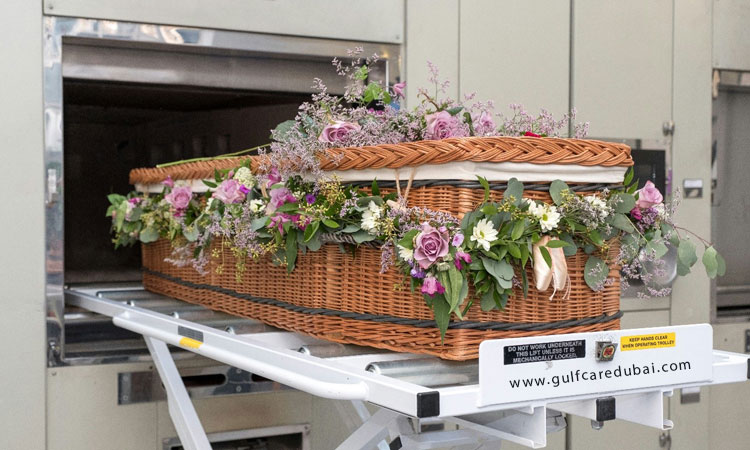
Types of Cremation
Cremation can be classified into individual, partitioned, and communal types, each suiting different preferences for handling the remains.
- Individual Cremation: Often referred to as private cremation this method ensures that your loved one is cremated alone in the chamber. It’s a choice, for those who want to keep the ashes.
- Partitioned Cremation: In this semi-private process multiple bodies are cremated together but separated within the chamber. This allows individual remains to be returned to families.
- Communal Cremation: In this process, multiple bodies are cremated together without any separation. The ashes are not returned but are usually scattered in a designated area. This option is cost-effective but individual ashes can’t be retrieved.
Environmental Considerations of Cremation
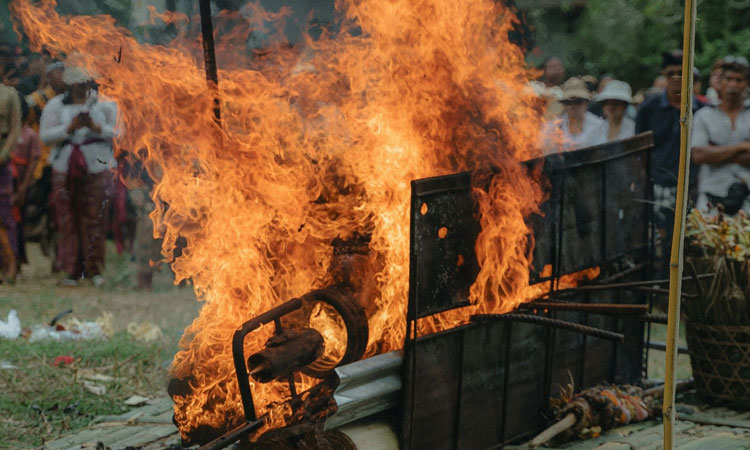
While standard cremation is perceived as a space-saving and economical option compared to burial, it does have environmental impacts:
- Energy Consumption: Cremation requires a significant amount of energy, mainly from the burning of fossil fuels. The process can use up energy as a 500 kilometer car journey.
- Emissions: The process emits greenhouse gases like carbon dioxide and pollutants such as nitrogen oxides and mercury into the air. These emissions contribute to air pollution and climate change.
- Mercury Pollution: The high temperatures involved in cremation can vaporize mercury from dental fillings, releasing it into the environment. This can be harmful to health and ecosystems.
Understanding these aspects can help you make a choice about cremation and additional services while considering preferences and broader environmental impacts.
Planning a Cremation
When you are planning the funeral service it is important to approach the process with respect and thoughtfulness, especially for expatriates residing in the UAE who may be handling arrangements from a distance.
How do I choose a cremation service provider?
To honor the memory of a loved one with dignity, you need to select the right cremation provider. Start with the research of a local provider of best cremation services or a reputable funeral home. You can check online resources, and recommendations from friends, family or community members. Reviews can also provide valuable insights.
Make sure the provider is licensed and inquire about their cremation practices including their collaboration with crematories and their role as a funeral home. During this difficult time it’s essential to ask about their policies, practices and the expertise of their staff. Cremation service providers should be transparent about cremation cost & their services and willing to answer all your questions.

Planning the Best Cremation Services
After Selecting the best cremation services provider, the next step is to plan the arrangements. If you are pre-planning the cremation for yourself, discuss your wishes with your family. Document your choices. For immediate needs, coordinate with the funeral director to understand the timeline , including obtaining the death certificate, and what you need to do.
Discuss types of best cremation services, such as direct cremation services or traditional cremation with a funeral service or memorial service. Each type has its procedures and costs involved. It’s important to select one that fits your preferences and budget.
Financial Considerations
Cremation can be more affordable option than traditional burial; however expenses can vary. Common costs include the cremation service, traditional funeral service, urn, and optional memorial service. Consider the following to manage these costs effectively:
- Budgeting: Set aside funds for the cremation expenses to reduce financial stress.
- Pre-Paying: Think about pre paying for services to lock in rates and avoid price increases.
- Seek Financial Assistance: Look into options like insurance, government benefits, or community fundraising to help cover expenses.
- Compare Prices: Request cost estimates from providers to compare and ensure you’re receiving the best value.
For UAE expats, it is advisable to understand both local and home country regulations regarding cremation, funeral home services and repatriation of remains. It is important to know all the legal requirements.
By carefully selecting a provider, planning cremation arrangements and handling financial matters thoughtfully you can ensure a dignified and smooth process during this difficult period.
Aftercare
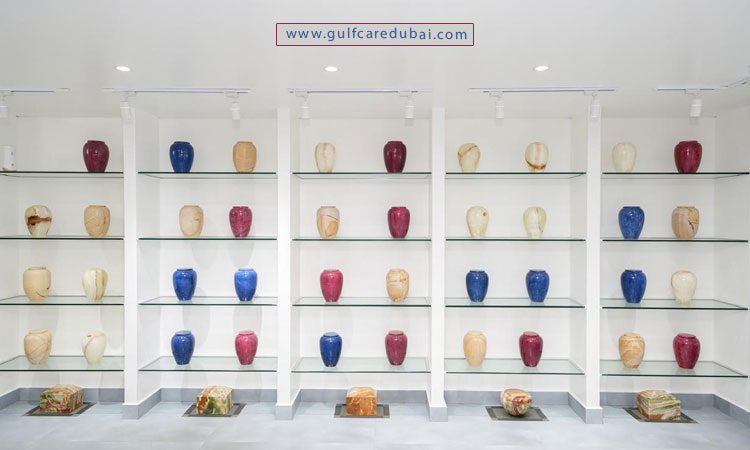
What to Do with Cremated Remains
Choosing what to do with cremated remains is a deeply personal choice that honors the wishes of the deceased while meeting the family’s needs. Here are some options to consider:
- Storage in Urns: You can choose to keep the ashes in the cremation urns within your home. Many families choose durable and visually appealing urns as a memorial.
- Cemetery Arrangements: Some families choose to place the urn in a columbarium niche or bury it in a cremation plot at a cemetery. Certain cemeteries offer scattering gardens for those who prefer a natural dispersion.
- Scattering Ashes: Scattering ashes is another option that allows you to honor the deceased by choosing a meaningful location such as a favorite park or over water. It’s important to follow regulations when scattering ashes.
- Memorial Options: Cremated remains can be transformed into various memorials such as reef structures in the ocean, memorial jewelry, or even mixed into concrete for unique sculptures.
Grief and Coping After a Loss
Dealing with grief after losing someone is an individual journey that differs for each person. Here are some strategies to help navigate through this time
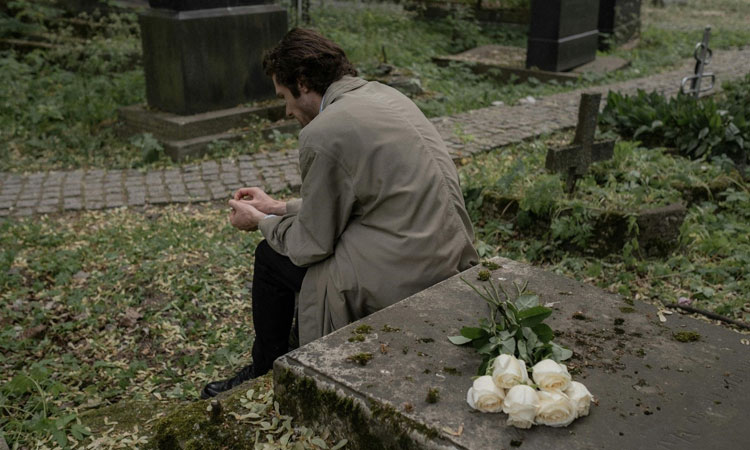
- Accept Your Grief: It’s normal to go through a range of emotions like sadness, anger or confusion, especially during this difficult time. Allowing yourself to experience these feelings is a part of the healing process.
- Talk About Your Feelings: Don’t hesitate to share your grief with friends and family. Seek support from a grief counselor, if required. Talking about your emotions can bring solace and aid in your healing journey.
- Maintain Routine: Maintaining your activities can help you feel a sense of normalcy and stability.
- Plan for Triggering Moments: Special occasions like anniversaries and holidays may bring feelings of loss. Planning ahead on how to manage these moments can be helpful.
- Self-Care: It is important to take care of your physical and mental health. Engage in activities that bring you comfort and peace.
- Postpone Major Decisions: It’s advisable to postpone major life decisions during the grieving process, as emotions can cloud your judgment.
- Help Others: Supporting others who are also mourning can help you in your healing journey.
- Celebrate the Life of Your Loved One: Remembering the good times and celebrating the life of your loved one can be a way to honor them and find solace.
Conclusion
In this guide we have explored the details of cremation, providing an overview starting from the initial steps, to the post care phase, specifically designed for expatriates residing in the UAE. This exploration has emphasized the significance of being well-informed and prepared, especially during a difficult time, when navigating the process of honoring a loved one’s memory through cremation.
As you move forward, it explains the steps involved in cremation, the different types available, and how cremation can impact the environment. This will help you make a decision that honors your loved one and respects your family’s wishes. The guide also acknowledges the importance of dealing with grief and offers strategies for managing those emotions. Additionally, understanding the role of a funeral home in the cremation process is crucial. Whether you need to choose a funeral home or understand its services, this guide will assist you in making informed decisions during this challenging period.

